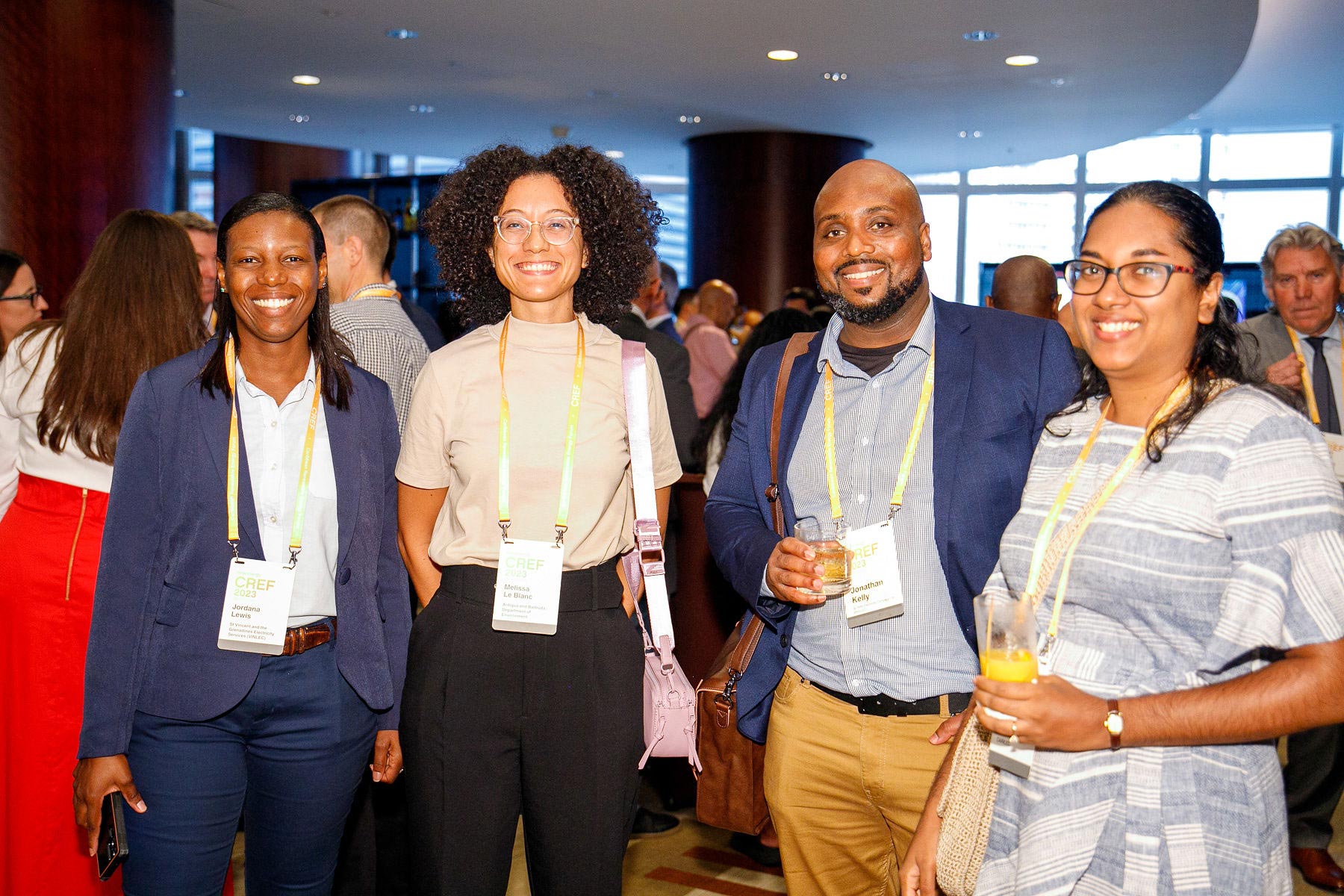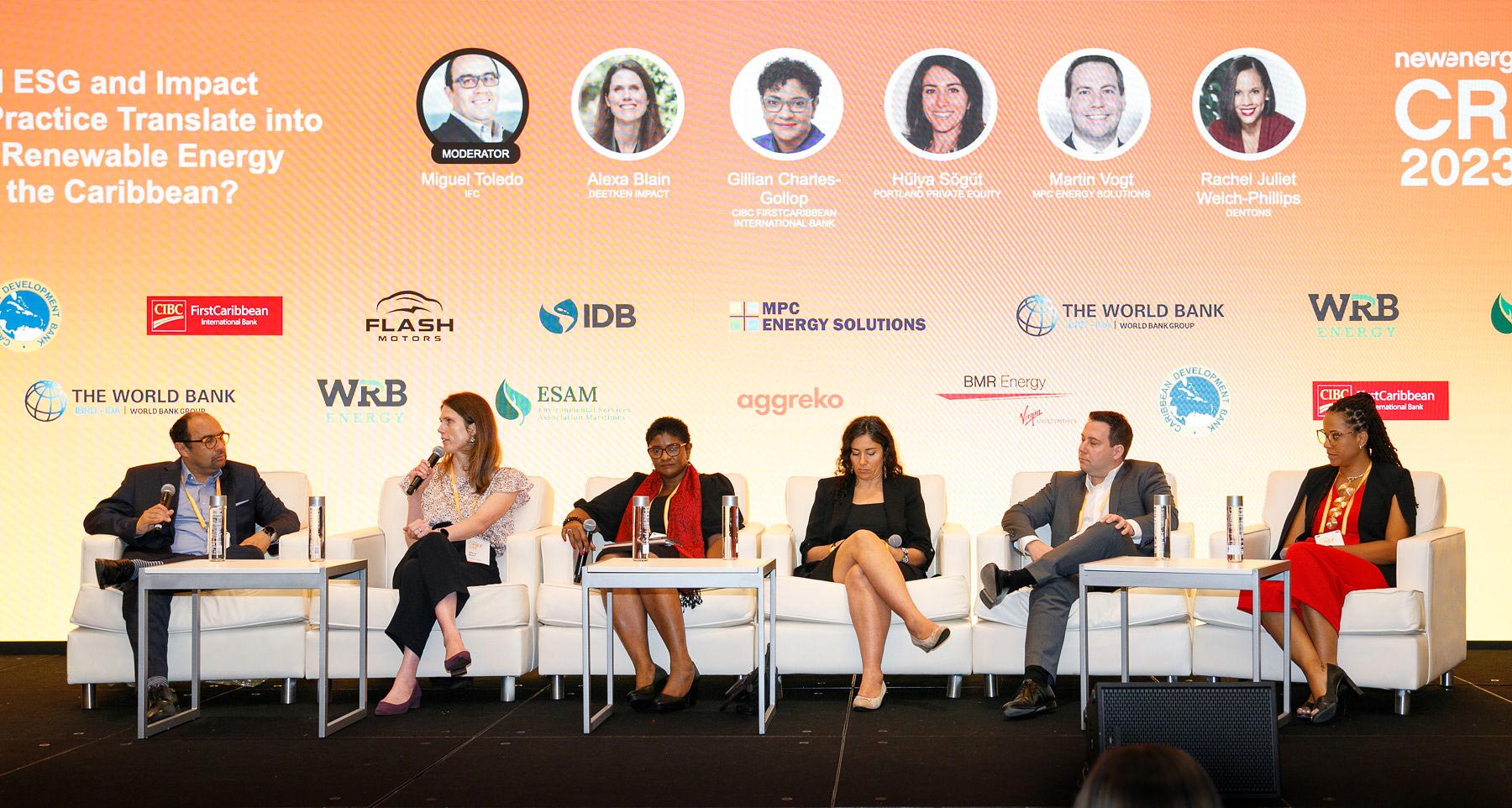
Working Together to Light a Fire under the Caribbean Energy Transition
The Caribbean Renewable Energy Forum brought together folks from across the Caribbean and beyond to accelerate the region’s energy transition. What’s next?
Last April, over 500 Caribbean energy practitioners and leaders gathered in Miami, Florida, for the 15th Annual Caribbean Renewable Energy Forum (CREF). CREF convenes annually to problem solve and seed innovative solutions to accelerate the region’s clean energy transition. From granular debate and discussion to cocktail hours and a sunrise 5K run, collaboration and connection is at the center of all programming.
That connection is unique. CREF gathers historically siloed sector voices — among them, government officials, utilities, developers, and investors — under one roof for an event which spans over 25 Caribbean nations. So what did we learn, and what do we takeaway, from CREF 2023?

RMI Women In Renewable Energy (WIRE) network and mentorship program members from Trinidad and Tobago, Antigua and Barbuda, and Saint Vincent, and Energy Transition Academy former fellow from St. Kitts and Nevis, meet in person during the CREF cocktail hour.
What Took Center Stage at This Year’s Forum
At CREF 2023, gender inclusion, enabling regulatory frameworks, and scaling renewable energy project efforts took center stage. The Women in Renewable Energy (WIRE) network held closed door events, including a luncheon where they discussed approaches to breaking through gender bias and inequities in the Caribbean energy sector.
The theme of “scaling” appeared through panel discussions on attracting investment to portfolios of projects, and through notable country commitments like the Commonwealth of Dominica signing a Framework Agreement that will initiate the first large-scale green hydrogen geothermal development in the Caribbean.

CREF holds a dynamic panel discussion around how ESG and impact investing practice can translate into capital for renewable energy projects in the Caribbean.
What’s Next?
Long-time attendees of CREF agreed that cross-sector collaboration is needed to carry forward, keep momentum, and effectively deliver on identified themes and opportunities. Given the diverse political, geographical, and social nature of all the Caribbean islands, diverse connections also ensure that national nuances are known and considered within regional approaches to the clean energy transition.
That’s why, at this CREF, RMI and New Energy asked the same question to nearly a dozen Caribbean representatives from across the energy sector, including project developers, utilities, government ministers, multilateral funders, and investors:
Over the next twelve months, from your industry perspective, what do we need to do to light a fire under the Caribbean clean energy transition?
Here are their responses:
Clean energy project developers: We must continue intentional collaboration and follow through on visionary ideas and policies.
“We need to maintain all the relationships that have been created here today as well as maintain the dialogue and continue the discourse. There are a number of ideas being discussed and policies that can be implemented, and we need to follow through to drive the energy transition.” — Angella Rainford, CEO and Founder of Soleco Energy.
“The islands themselves are now ready to take some action. There are some clear steps: The alignment between agencies within the government; a clear message from the top; and maybe assigning someone to shepherd it [projects] through the various agencies will help each island and country move their programs ahead.” — Bruce Levy, CEO and President of BMR Energy.
National Utilities: We must share experiential knowledge and create enabling regulatory frameworks.
“It could be great if CREF could organize a Caribbean energy project’s tour. When people experience things, it gives them greater impetus to move.” — Rick Case, Director of Engineering Services with Jamaica Public Service Company Limited
“Continue the communications, set targets, commit, ACT, and be accountable. One of the immediate actions should be on fixing the regulatory framework that needs to catch up with utility innovation and industry trends.” — Rachell Roullet, Vice President of Innovation, Technology, and Strategic Planning with FortisTCI Ltd.
Governments: We must understand our unique differences, while collaborating toward a common goal. This will allow us to secure sufficient funding.
“[We must] recognize and appreciate our distinctive susceptibilities and obstacles while intensifying our collaborative efforts to access the resources made available to us by multilateral development banks and related institutions. United, let us join hands in solidarity. Although our individual circumstances may vary, we all face similar consequences due to climate change. Ultimately, our shared objective is to facilitate a successful and sustainable energy transition for the betterment of all.” — Grenada Minister for Climate Resilience, the Environment and Renewable Energy, Hon. Minister Kerryne James
“After this particular CREF, we must talk more and see what we can achieve together over the next year so that when we come to the next CREF, many of us have positive stories to articulate on our progress. I think it’s crucial the opportunity for us to achieve a number of things, whether it be to collaborate on how we might access capital, how we can perhaps work together on the experiences we’ve had with regulation, and with developing true opportunities to build capacity amongst each other.” — Bermuda Minister of Home Affairs, Hon. Minister Walter Roban
“The key issue for small countries like Barbados and those in the Caribbean is often that of scale. On the one hand, the scale of production and procurement in our countries is significantly smaller than developed and larger economies but our needs are just as critical as the transitions being pursued in those countries. So, we need to be able to attract financing of sovereign needs and investment capital for commercial projects that understands the importance of balancing scale with the needs of SIDS who must make this energy transition. ” — Barbados Minister of Energy and Business, Hon. Minister Lisa Cummins
Multilateral Funders: We must set up frameworks to allow private capital to flow to the region.
“A critical, 12-month obstacle to funding the resilience cost gap in the Caribbean energy sector is to design a solid regional framework and mechanism to streamline and accelerate transaction processes, to mobilize private capital in renewable energy. A critical, 12-month action towards resilient Caribbean islands is to upgrade their economic model (e.g., digital nomads? High value agri-transformation? Entertainment industry hub?) to be more compatible with their fragile ecosystems (mangroves) and their socioeconomic aspirations.” — Frederic Verdol, Senior Power Engineer at the World Bank
Investors: We need to address regulatory barriers to create an enabling environment to facilitate bankable and investor ready projects.
“The Caribbean needs to finally tackle the issue of regulation. I have been hearing for six years now the same complaint at CREF: regulation is the issue, which then causes (at least partially) the lack of viable renewable energy projects. The Caribbean Development Bank was clear: a Caribbean regulatory framework is the solution, which I also believe is a crucial milestone. Then the framework can be translated into national regulation and open the way to more bankable and investor-ready renewable energy projects.” — Hülya Sögüt, Partner with Portland Private Equity
Zooming Out: Global Implications of the Caribbean Energy Transition
Dr. James Fletcher, Chairman of the Executive Board of the Caribbean Centre for Renewable Energy and Energy Efficiency, summarized multiple perspectives, stating, “What we need in the Caribbean energy space are leaders that bring people together and make things happen.” The progress happening today in the Caribbean has global implications. Dr. Fletcher went on to share, “By showing that we, as small islands that are the victims, are still willing to do what needs to be done to transition the world away from the thirst that it has for using fossil fuels, we can stand up to say to the developed countries that are the cause of this problem that you guys need to step up and you need to do something.”